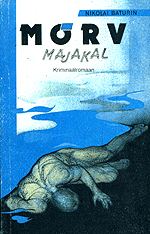
A MURDER AT THE LIGHTHOUSE
A crime novel.
(A brief synopsis)
Note: To be more precise, this novel could also be called “an existential crime novel”, the culmination occurs in the earthly world, while the resolution is reached in the heavenly world.
A seaside village, which is also known for its curative mud, is a holidaymakers' favourite haunt. Some of them are “oldtimers” who come to the village every summer and some are newcomers who have not visited the place before. KARL SONNING, a renowned nuclear physicist and his wife KAIS, twenty years his junior, spend all their summers at KILJUKIVI, a large mansion-like looking farmhouse.
In the attic of the same farmhouse a newcomer, HEBERT RINCK, is staying. HEBERT is keen on underwater photography and has his gear with him: aqualungs, torchlights and two small nickeled anchors, which hold the torchlights in place on the sea floor).
It seems a quiet, unpretensious story and then suddenly the conflict erupts.
(An excerpt from the novel. Prologue .)
It is night, black as a caraway seed, the dark night of an unenlightened soul.
Probably a small room; the interior is in the shadows. Yet, the window frames glow in the dark, the panes reflect the starry skies. Under the window stands a naked couple, two people embracing each other. An anxious female voice cuts into the silence:
“Hebert, can you see the two stars reflected in the middle of the window?”
A man's head moves away from the woman's, he tries to looks upward.
“Castor and Pollux”, the man says and kisses the woman's hair. “Heavenly brothers.”
“The twins – left to their own devices, who are fooling around … our fate is in their hands ,” the woman's voice is getting even more anxious.
“And so that we couldn't interfere they've flown high up,” the man tries to soften her anxiety with a joke.
Either because of a feeling of awe before the skies or her guilty conscience the woman clings stronger to the man and bracing herself repeats slowly and calmly:
“You said ‘Castor and Pollux'..
The sea murmurs, the stars shine and no evil is done in the world.
The next morning KARL SONNING returns from a conference in Zurich. After dismissing his chauffeur, he hugs his wife, grabs a towel from the peg and says to his beautiful wife.
“I'm going for a swim, Kais, to wash off the dust – I'll be back in a jiffy.”
On his way to the lighthouse, which stands on a cape jutting out into the sea, SONNING meets the host LANDSTRÖM (another of his rivals) and a stranger (underwater photographer RINCK), who has arrived when he was away. Before diving into the water, SONNING also notices two small red bikes left on the sandy beach that are new in these surroundings.
KARL SONNING dives - and is no longer seen alive.
His body is washed ashore by the waves and is found by LANDSTRÖM a couple of days later; a small nickeled anchor on a naylon ribbon is attached to the leg, which the detective KOLLOM sees as an evidence. The only suspect is the lover of SONNING's wife, the underwater photographer RINCK, whose gear included nickeled anchors. During the investigation KOLLOM is trying to find the twins , the owners of red bikes, but no one in the village knows them or has seen them. Yet, someone has seen them and knows that an ASTRONOMER, who has recently bought a farm at the seaside, has two boys. However, when the detective goes to the farm, the house is deserted, its windows are broken and all covered with entangled vegetation. The detective KOLLOM arrests the only murder suspect HEBERT RINCK, who is carted away by a copter. It seems that the thrilling story has reached its conclusion… until another nickeled anchor is found . The village POSTMAN has dozed off on the sandy beach and when he yawningly wakes up, he notices an anchor tied on a nylon ribbon around his leg – and twin brothers pedalling away furiously. THE POSTMAN cannot believe his eyes when the small bikes suddenly take off and rise higher and higher into the air. “Hey, guys, what're you called?” he calls out in bewilderment, or in amusement. One of the brothers turns around and says, “Castor and Pollux.”